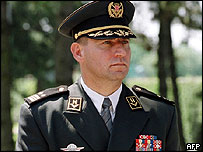 Yesterday, two men who helped renegade General Gotovina on the run by supplying him with fake passports were arrested.
Yesterday, two men who helped renegade General Gotovina on the run by supplying him with fake passports were arrested. Albania, Bosnia, Croatia, Macedonia, and Serbia and Montenegro have been promised that they can join the European Union once they are ready, (but as with Turkey) there's no timetable for accession. From all those countries, only Croatia is economically and otherwise fit for it, but there's one big obstacle: The European Union requires Croatia to hand out war criminals to the International Criminal Tribunal, and in the last two years over a dozen wanted were turned in or surrendered voluntarily to the ICTY in The Hague. General Gotovina is accused for crimes against humanity in the Krajina region under his command during the war. For the Croats, he is a hero. When I visited Croatia two years ago, I saw posters and leaflets all over the country, pledging loyalty to the general. At the main road from the southeast to Zadar, there's a huge poster a few kilometers outside the city, labelled "Zadar county - General Gotovina, we stand with you!". Too bad I didn' take a picture of it back then. When I worked in 2003 for the Konrad Adenauer Foundation, I met a lot of Croatians who thought that even if it were true that war crimes were overlooked or even permitted under Gotovina's command, sending him to The Hague would be absolutely unacceptable. The reasoning is usually founded on the wide spread perception of the war that Croatia fought for its freedom and indepence from the Serbs. Since the enemy violated the Geneva conventions, indicting people who put their life on the line for Croatia's freedom is out of the question. The leader of HNS (Croatian People's Party), Vesna Pusić, has been quoted that the former government hesitated to surrender Gotovina in fear of an uprising in the country - this view has been rejected by the current Prime Minister Ivo Sanader who blames his political opponents for incompetency in regards to apprehend the general. I don't know what will happen if the government catches and sends him to The Hague, but I'm certain the people won't like it.
For the European Union, asking to fully cooperate with the ICTY is easy, but just under ten years after Operation Storm they can't expect Croatians to deal with their history as they should. Such things take their time, Germany needed a rise from the ruins of World War 2 and the student movement in the 60ies to start dealing honestly with its Fascist past. How long it will Croatia to cool off the current nationalism nobody knows, but it will take longer than a decade. The last decade under Franjo Tuđman's authoritarian rule certainly didn't help.
» Post a Comment